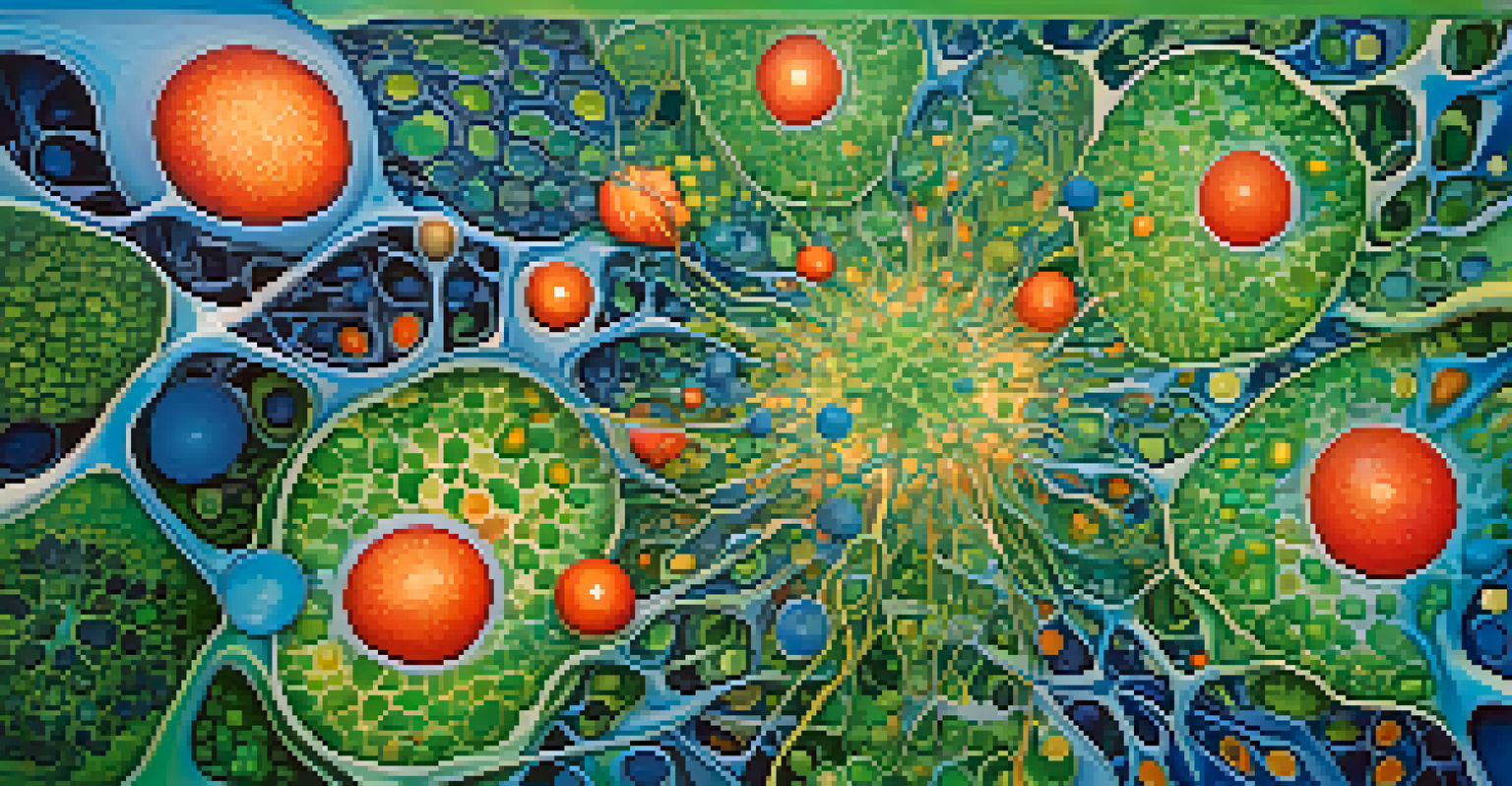Psychedelics and Autoimmunity: A Closer Look

Understanding Autoimmunity: What It Means for Your Body
Autoimmunity occurs when the immune system mistakenly attacks healthy cells. This can lead to a variety of chronic conditions, such as rheumatoid arthritis and lupus. Essentially, the body is in a state of confusion, targeting its own tissues as if they were foreign invaders.
The greatest wealth is health.
The effects of autoimmune diseases can be debilitating, impacting daily life and overall well-being. Symptoms can range from fatigue and joint pain to skin issues and organ dysfunction. Understanding these conditions is crucial for exploring potential treatments and interventions.
Recent research has brought attention to the role of the immune system in many health conditions, including mental health disorders. This opens doors to exploring unconventional treatments, such as psychedelics, that may offer new insights into managing autoimmunity.
Psychedelics: A Brief Overview of Their History and Use
Psychedelics, which include substances like psilocybin and LSD, have a long history of use in various cultures for spiritual and healing purposes. In recent years, there's been a resurgence in interest, particularly regarding their potential therapeutic benefits. This revival is influencing how we view mental health treatments.

Research into psychedelics has shown promising results in treating conditions like depression and PTSD. The compounds work by altering brain connectivity and promoting neuroplasticity, which can lead to transformative experiences. These changes in perception may also play a role in how the body responds to inflammation and immune function.
Autoimmunity Affects Daily Life
Autoimmunity leads the immune system to mistakenly attack healthy cells, resulting in chronic conditions that can significantly impact well-being.
As psychedelics gain acceptance in the medical community, their implications for autoimmune diseases are gradually being explored. This intersection of mental health and autoimmune response is a burgeoning area of study, offering hope for innovative therapies.
The Immune System: How Psychedelics Might Influence It
Psychedelics have been shown to affect the immune system in various ways, potentially modulating inflammatory responses. For instance, some studies suggest that they may reduce levels of pro-inflammatory cytokines, which are proteins that can exacerbate autoimmune conditions. This modulation could lead to less overall inflammation in the body.
The mind is everything. What you think, you become.
By promoting a more balanced immune response, psychedelics might help alleviate the symptoms of autoimmune diseases. The idea is that by reducing the immune system's tendency to attack itself, individuals may experience fewer flare-ups and improved quality of life. This could be a game-changer for those living with chronic pain and fatigue.
Although research is still in its infancy, these findings provide a fascinating glimpse into how psychedelics could serve as adjunct therapies for immune-related conditions. Combining traditional treatments with psychedelics might pave the way for more comprehensive care.
Psychedelics and Mental Health: A Dual Approach
Many autoimmune diseases are accompanied by mental health challenges, such as anxiety and depression. This overlap can create a cycle where physical symptoms worsen mental health, which in turn exacerbates physical symptoms. Addressing both aspects is crucial for holistic healing.
Psychedelics have shown promise in breaking this cycle by providing profound psychological insights and emotional healing. The therapeutic experiences induced by these substances can help individuals process trauma and reduce anxiety, potentially leading to improved immune function. This dual approach is particularly appealing for those struggling with both autoimmunity and mental health issues.
Psychedelics May Aid Treatment
Research suggests that psychedelics could modulate immune responses, potentially reducing inflammation and alleviating symptoms of autoimmune diseases.
Moreover, the use of psychedelics in therapy often encourages mindfulness and self-reflection, which can enhance overall well-being. This mental clarity may help individuals manage their autoimmune conditions more effectively, creating a more harmonious relationship with their bodies.
Current Research: What Studies Are Saying About Psychedelics
Research on psychedelics and autoimmunity is still in the early stages, but initial studies are promising. Some clinical trials have begun exploring the effects of psychedelics on inflammation and immune response. These studies are crucial for understanding the broader implications of psychedelics on health.
For example, a recent study suggested that psychedelics could help reduce anxiety in patients with autoimmune disorders, which may indirectly support immune health. As researchers delve deeper, we may uncover more direct benefits of these substances on autoimmune conditions.
As the field evolves, continued research will be key in determining the safety and efficacy of psychedelics for autoimmune patients. This could lead to groundbreaking treatments that offer relief for many people struggling with chronic conditions.
Challenges and Considerations in Psychedelic Research
Despite the exciting possibilities, the research into psychedelics faces significant challenges. Regulatory hurdles, stigma, and lack of funding can impede progress. Additionally, the complexity of autoimmune conditions makes it difficult to establish clear guidelines for treatment.
It's essential to approach this research with caution, ensuring that studies are well-designed and ethical. The potential for misuse or misunderstanding of psychedelics can overshadow their benefits if not handled properly. Establishing protocols will be vital to ensure patient safety and effective outcomes.
Holistic Approach to Healing
Addressing both physical and mental health through psychedelics may break the cycle of worsening symptoms, leading to improved quality of life for those with autoimmune conditions.
Furthermore, as researchers study the effects of psychedelics, they must also consider individual differences in response. Not everyone will experience the same benefits, and understanding these nuances is important for developing tailored therapeutic approaches.
Looking Ahead: The Future of Psychedelics in Autoimmunity
As research progresses, the future of psychedelics in treating autoimmune diseases looks promising. With an increasing number of clinical trials and a growing acceptance of these substances, we may soon see them integrated into conventional treatment plans. This could revolutionize the way we approach autoimmune care.
The potential for psychedelics to offer relief not only from physical symptoms but also from the psychological burdens of chronic illness is significant. This holistic approach could lead to more effective management strategies, improving the quality of life for those affected.

Ultimately, the journey of understanding how psychedelics interact with autoimmunity is just beginning. Continued exploration will help clarify their role in health and well-being, paving the way for innovative therapies that could transform lives.